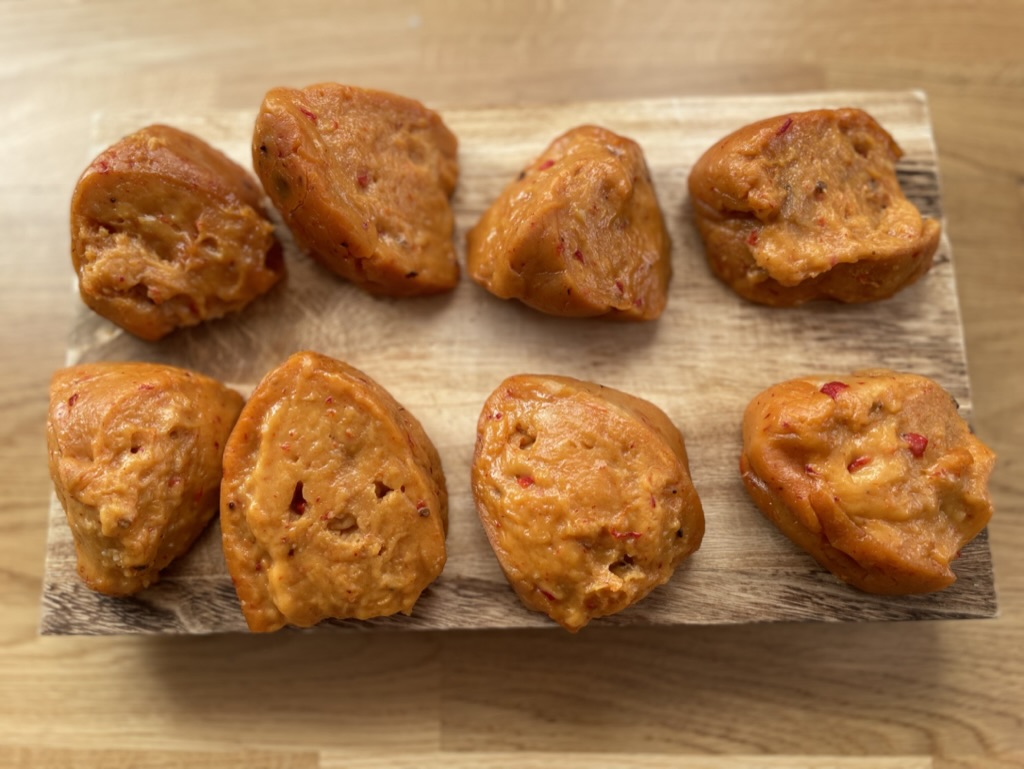It’s that time of year. Once or twice a year, I make plant-based cheese in bulk, and today’s the day.
You know when you’re cooking and there are days when things simply aren’t flowing? When you twitch as you add the seasoning and accidentally add a lot more than you intended? Or you did things as you usually do, but something still got burnt? We all have those days when things aren’t going right, but today – thankfully! – wasn’t one of them.
Every time I make this kind of cheese, I make two varieties. One regular and one pepper jack. I also tend to save a bit of the cheese batter from the pepper jack cheese and use it as cream cheese the morning after. So good!
The content below was originally paywalled.
Make it work
My cheeses are based on koji rice, but since I am all about reducing waste, sometimes I make alternative versions of them. Today I made a version of my regular recipe but with sake kasu instead of koji rice. And honestly, I’m not sure I’m going back to koji rice after this. Wow. Just… wow.
For those of you who aren’t familiar, koji rice is rice that has been mixed with koji spores and has then fermented until the spores cover the rice completely. I usually freeze mine after that and use it as needed.
Sake kasu is the sake lees that you are left with when you make sake. They already have a cheesy scent and flavour, so they are certainly an appropriate ingredient in plant-based cheese.
Now what?
Now that I have made the cheeses, many kilograms worth, I brush them with coconut oil as a way of waxing them. I’ve found that it helps them last longer. Especially when I age the regular ones in the refrigerator to get a plant-based alternative to parmesan.
I generally wrap them up and freeze them. When I need one, I just fetch it and place it in a bag in the refrigerator.
One of these larger batches is the same as three batches of my regular cheese recipe. Times two, of course, since I make two different varieties. So it is only natural that they last me at least 8-9 months, though likely longer still.
I can slice them, cut them, melt them, grate them, age them and while I haven’t tried it yet, I am fairly sure I could smoke them as well. I must add that to my list. It’s not right that I haven’t tried that yet, but to be fair, I don’t yet have a smoker. Nevertheless, it would be nice to know that it is something I can do with this recipe.
Look at that… 2023 isn’t even over and I am already making to do-lists for 2024. Some things never change, eh?
The financial aspect
I barely pay anything for these cheeses, since they are made with ingredients I already have at home, some of which I grew myself. And this time, the base of the cheeses was sake lees, which is a bi-product. So I spent even less. Now, compare that to the vegan cheeses in the supermarket. They’re incredibly expensive, very small, covered by a fair amount of plastic, and let’s face it, they’re not that good. Some are okay, but most of them are not worth putting in your body. They just can’t compare to homemade plant-based cheeses.
Far better flavour, greater amounts and at a far lighter expense? Don’t mind if I do.
No Nuts
Contrary to what some people believe, all plant-based cheeses do not contain nuts. I for one cannot eat nuts. Something that some pity me over, but it doesn’t bother me much. It only bothers me when I go out to eat with other people. Food today just isn’t safe.
My homemade cheeses are safe, however, and they have never contained nuts. There is no need for nuts in them. Oftentimes it is better to learn how to make something yourself and make it just the way you want it, rather than get upset that the pre-made stuff doesn’t work for you. The truth is that the pre-made stuff doesn’t work for any of us, allergies or no. It just takes longer for the effects to be apparent in some people.
Some words of encouragement
If you have been thinking about making your own plant-based cheese, I am here to tell you that you definitely should. It is so worth it. The texture, the flavour and the ease of it make it all worthwhile.
Discover more from Desoullife
Subscribe to get the latest posts sent to your email.
